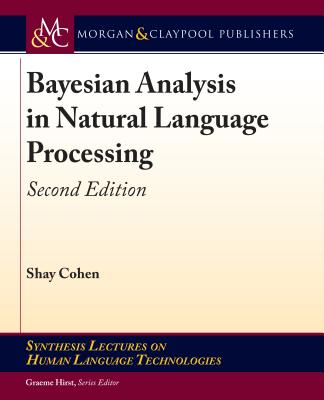Bayesian Analysis in Natural Language Processing
暫譯: 自然語言處理中的貝葉斯分析
Shay Cohen
- 出版商: Morgan & Claypool
- 出版日期: 2016-06-01
- 售價: $2,900
- 貴賓價: 9.5 折 $2,755
- 語言: 英文
- 頁數: 276
- 裝訂: Paperback
- ISBN: 1627058737
- ISBN-13: 9781627058735
-
相關分類:
Natural Language Processing
海外代購書籍(需單獨結帳)
相關主題
商品描述
Natural language processing (NLP) went through a profound transformation in the mid-1980s when it shifted to make heavy use of corpora and data-driven techniques to analyze language. Since then, the use of statistical techniques in NLP has evolved in several ways. One such example of evolution took place in the late 1990s or early 2000s, when full-fledged Bayesian machinery was introduced to NLP. This Bayesian approach to NLP has come to accommodate for various shortcomings in the frequentist approach and to enrich it, especially in the unsupervised setting, where statistical learning is done without target prediction examples.
We cover the methods and algorithms that are needed to fluently read Bayesian learning papers in NLP and to do research in the area. These methods and algorithms are partially borrowed from both machine learning and statistics and are partially developed "in-house" in NLP. We cover inference techniques such as Markov chain Monte Carlo sampling and variational inference, Bayesian estimation, and nonparametric modeling. We also cover fundamental concepts in Bayesian statistics such as prior distributions, conjugacy, and generative modeling. Finally, we cover some of the fundamental modeling techniques in NLP, such as grammar modeling and their use with Bayesian analysis.
商品描述(中文翻譯)
自然語言處理(NLP)在1980年代中期經歷了一次深刻的轉變,當時它開始大量使用語料庫和數據驅動技術來分析語言。自那時以來,NLP中統計技術的使用已經以多種方式演變。其中一個演變的例子發生在1990年代末或2000年代初,當時完整的貝葉斯機制被引入到NLP中。這種貝葉斯方法已經能夠彌補頻率主義方法的各種不足,並使其更加豐富,特別是在無監督的環境中,統計學習是在沒有目標預測示例的情況下進行的。
我們將介紹流利閱讀NLP中貝葉斯學習論文和在該領域進行研究所需的方法和算法。這些方法和算法部分借鑒自機器學習和統計學,部分則是在NLP中“內部”開發的。我們涵蓋了推斷技術,如馬爾可夫鏈蒙特卡羅取樣(Markov chain Monte Carlo sampling)和變分推斷(variational inference)、貝葉斯估計(Bayesian estimation)以及非參數建模(nonparametric modeling)。我們還涵蓋了貝葉斯統計中的基本概念,如先驗分佈(prior distributions)、共軛性(conjugacy)和生成建模(generative modeling)。最後,我們將介紹NLP中的一些基本建模技術,如語法建模(grammar modeling)及其與貝葉斯分析的結合使用。











